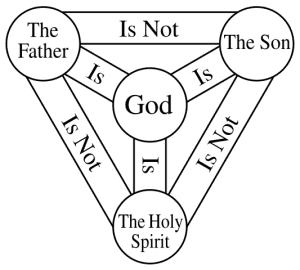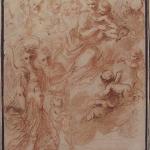Lucas Banzoli is a very active Brazilian anti-Catholic polemicist, who holds to basically a Seventh-Day Adventist theology, whereby there is no such thing as a soul that consciously exists outside of a body, and no hell (soul sleep and annihilationism). This leads him to a Christology which is deficient and heterodox in terms of Christ’s human nature after His death. He has a Master’s degree in theology, a degree and postgraduate work in history, a license in letters, and is a history teacher, author of 25 books, as well as blogmaster (but now inactive) for six blogs. He’s active on YouTube.
This is my 46th refutation of Banzoli’s writings. From 5-25-22 until 11-12-22 (almost half a year) he didn’t write even one single word in reply. Since then he has mustered up the courage to counter-respond three times. Why so few and so late? Well, he says it’s because my articles are “without exception poor, superficial and weak” and that my “objective” was “not to refute anything, but to exhaust [my] opponent.” Indeed, he thinks my writings are so bad that “only a severely cognitively impaired person would be inclined to take” them “seriously.”
He didn’t “waste time reading” 37 of my first 40 replies (three articles being his proof of the worthlessness of all of my 4,000+ articles and 51 books). He also denied that I had a “job” and claimed that I didn’t “work.” I disposed of his never-ending ridiculous and slanderous insults in Facebook posts dated 11-13-22 and 11-15-22 (henceforth the personal attacks will be routinely ignored as boorish, juvenile, and boring). Banzoli now thinks that replying to me is so “entertaining” that he resolved to “make a point of rebutting” my articles “one by one.”
*****
Lucas Banzoli, in his article, “Os mortos intercedem pelos vivos? (Refutação a Dave Armstrong)” [Do the dead intercede for the living? (Rebuttal to Dave Armstrong)] (11-19-22), starts out with 929 words of rabid, wild personal attacks and defenses of himself as a theist. The latter point is the only valid one in his tirade. I had described him in my introductions to replies as not being a theist, when what I actually had in mind (and wasn’t clear or precise enough) was that he was not a classical theist.
In foreshadowing the Lord’s death on the Cross, Psalm 31:5 says: “Into thy hand I commit my spirit [ruach].” The “spirit” that Christ committed into the hands of His Father was nothing else than His human life which He was leaving in the hands of His Father to await its resurrection. As the animating principle of His life left Him, the Lord died and sank into unconsciousness.
Speaking of marine creatures, the Psalmist says: “When thou takest away their breath [ruach] they die and return to their dust” (Ps 104:29). No one will argue that the spirit–ruach that God takes away from the fish at death carries consciousness and personality. We have reason to believe that the same is true for human beings, because the same expression is used for both. . . .
The existence of the soul depends upon the presence of God’s life-giving breath [neshamah] or spirit [ruach]. And when the life-giving spirit is withdrawn, a person ceases to be a living soul and becomes a dead soul. (p. 68)
[D]uring the three days of his burial [Jesus] was resting in the grave, waiting for His Father to call Him back to life. (p. 179)
[I]f Christ had to die bodily to redeem our body, why wouldn’t he have to die as a soul to redeem our soul? If body and soul are two distinct entities and Jesus died for both, it is clear that he would have to to die in body and soul, not just in body. The price to be paid for our redemption was death, and if death was in our place, it embraces body and soul, for both were redeemed at the cross. In other words, to say that the soul of Jesus did not experienced death is the same as saying that our soul did not need redemption. . . . Jesus was clear: his own soul would die in our favor. He would sacrifice not only his body but also his soul. His sacrifice was complete. To deny this is to diminish the Saviour’s sacrifice. (pp. 1072-1074)
*
Banzoli does manage to maintain the divinity of Christ, however, by believing that His Divine Nature never ceased to exist at any time:
On the other hand, we must not forget that Jesus was not just any man, but God incarnate. And, in His divine nature, Jesus never passed through death, for it is not possible for divinity to die or cease to exist for even a second (1 Timothy 6:16 [“who alone has immortality”]). This is what distinguishes the case of Jesus from ours, since none of us are God incarnate, nor do we have a divine nature. Thus, Jesus is a sui generis case – a unique and singular case, that cannot be compared to any other. He is the only one who can “die and not die” (die like a man, and not die like God). (p. 1074)
*
I was mistaken about this before I discovered the above passage, on 2-21-23. He had not directed me to it, even though I asked him more than once to clarify and explain his Christology, and stated that I would retract and publicly apologize for getting his views wrong, if that turned out to be the case (and I’m very happy that I was wrong).
I found the passage above in a search of his 1900-page Portugese book on the soul. In light of this, I offer Lucas Banzoli my sincere and full apology for wrongly classifying him as a non-Christian and non-trinitarian. I was going by the information I had, in the absence of clarification from him, that would have prevented my erroneous conclusion. I will change my introduction to my rebuttals of his work accordingly, and try to remove any other inaccurate references of this nature in my many replies.
*
PayPal donations are the easiest: just send to my email address: [email protected]. You’ll see the term “Catholic Used Book Service”, which is my old side-business. To learn about the different methods of contributing, including 100% tax deduction, etc., see my page: About Catholic Apologist Dave Armstrong / Donation Information. Thanks a million from the bottom of my heart!
***
Photo credit: Basic minimal (equilateral triangular) version of the “Shield of the Trinity” or Scutum Fidei diagram of traditional Christian symbolism [public domain / Wikimedia Commons]
***
Summary: Lucas Banzoli holds to a Seventh-Day Adventist eschatology & Christology, leading him to a deficient & heterodox view of Christ’s human nature after His death.













